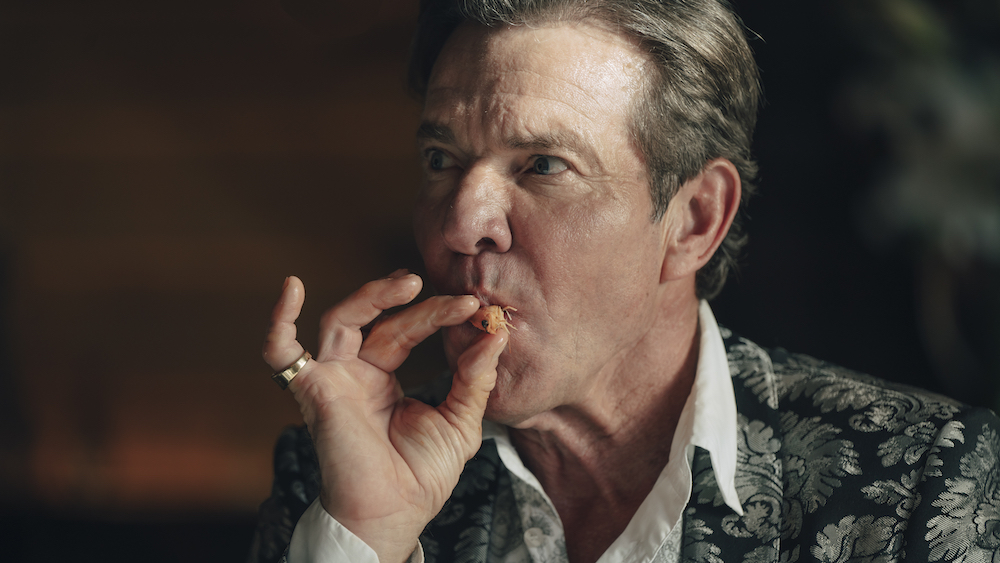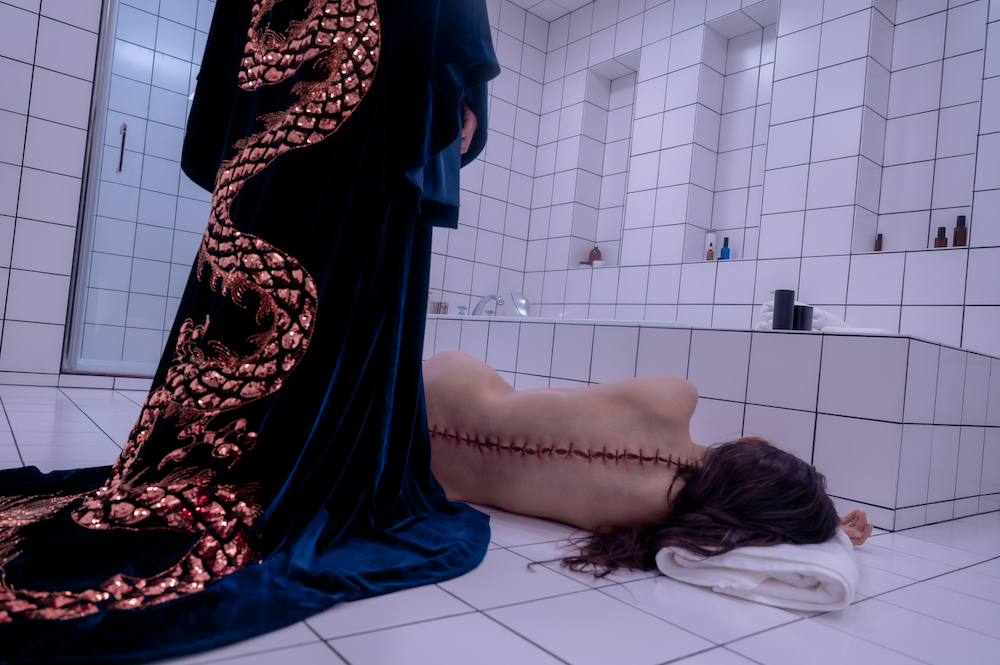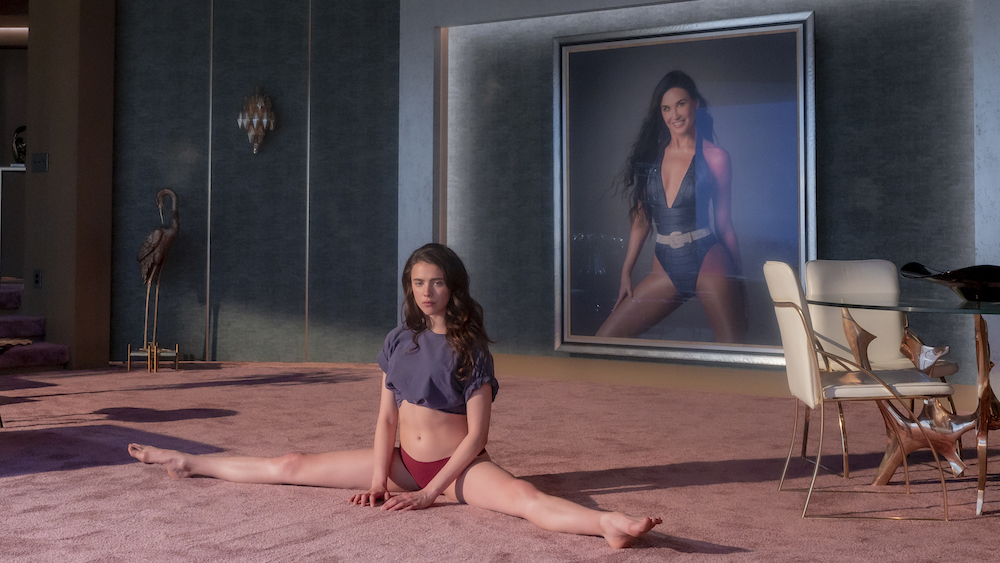If you like a body-horror movie to retain a semblance of logic in its plot line, then The Substance – grotesque, gory and finally insubstantial – may not be for you.
French director Coralie Fargeat’s second feature (her first was Revenge in 2017, a rape-revenge thriller) is a stylised commentary on the female body, Hollywood, sexism and ageism. It’s over-long and repetitive but still packs a gloriously hyper-real punch, shot by Benjamin Kracun, full of vivid colour, wide-angled lenses and movie references such as Carrie, Alien, The Elephant Man, Frankenstein, Barbie, with a Psycho shower-head thrown in.
And Demi Moore is terrific as fading celeb Elizabeth Sparkle, a Jane-Fonda-esque host of a glossy TV fitness show. On her 50th birthday she overhears the cartoonishly misogynistic TV exec, called – of course - Harvey (Dennis Quaid, pictured below), ranting on the phone that she’s too old for the job. “Find me somebody new now,” he yells.
Later, over lunch – he’s a terribly messy shrimp eater - he tells her that at 50, “It stops.” “What stops?” she asks. He doesn’t elaborate. Distraught, she drives off, sees the billboard for her show being torn down above the highway and crashes her car. Miraculously unscathed, she’s sobbing in the hospital when a doctor – an extraordinarily young and attractive one – slips her a flash drive, introducing her to the Substance.
 She sits in her cavernously huge, shiny apartment with its picture window and enormous TV screen. One injection, she learns, will unlock your DNA and release another version of yourself. At first, she chucks it in the bin but when despair takes hold, she calls the number on her bright red phone. Yes, a landline. The Substance exists in another dimension.
She sits in her cavernously huge, shiny apartment with its picture window and enormous TV screen. One injection, she learns, will unlock your DNA and release another version of yourself. At first, she chucks it in the bin but when despair takes hold, she calls the number on her bright red phone. Yes, a landline. The Substance exists in another dimension.
The cell-replication process gets underway. As her skin roils and she writhes in agony, naked on the floor of her pristine white bathroom (the mind turns to that Annie Leibovitz Vanity Fair cover of 1991), her spine splits open to reveal…Margaret Qualley (Poor Things; Drive Away Dolls, Kinds of Kindness), soon to be known as Sue. She’s actually an entirely separate being, rather than a better version of Elizabeth, so this rather seems to defeat the point.
 The rules of the Substance require balance to be maintained. One week in the new body, one week in the old. There are a lot of tubes and needles. It doesn’t look easy. You have to make sure the off-week body receives sustenance, via the tubes and needles. This does get rather samey and tiresome. Stabilise every day. And always remember that you are one, intones the voice at the end of the phone. You can’t escape from yourself. Something could so easily go wrong, and does.
The rules of the Substance require balance to be maintained. One week in the new body, one week in the old. There are a lot of tubes and needles. It doesn’t look easy. You have to make sure the off-week body receives sustenance, via the tubes and needles. This does get rather samey and tiresome. Stabilise every day. And always remember that you are one, intones the voice at the end of the phone. You can’t escape from yourself. Something could so easily go wrong, and does.
I’d expected female solidarity, with Sue setting out to wreak feminist revenge on Harvey and his loathsome Hollywood cabal. But no. It’s each woman for herself. She spots an ad in the paper – another out-of-time moment – for a new Elizabeth Sparkle. Only those aged 18 to 30 need apply. Harvey is thrilled - Sue (Margaret Qualley, pictured below) is perfect. Soon she’s the new face of the fitness show, partying hard and forgetting about the matrix, Elizabeth, on the bathroom floor, or actually in a cupboard that the superhumanly strong Sue has hewn out of the walls.
So these two are not one, and Elizabeth only knows what Sue is doing – and vice versa - when she has to clear up the mess afterwards and when she sees with horror that parts of her body - specifically a wizened, blackened finger - are ageing at an alarming pace, due to Sue’s not observing protocol. Time to get out the opera gloves.
 It’s clear from the number of deposit boxes in the grimy alleyway where Elizabeth, in her sunglasses and bright yellow coat, has to go and pick up Substance refills, that she’s not alone. In a diner, an elderly gent winks at her. Could he be the young doctor from the hospital? “It’s long, the seven days,” he tells her. “Has she started eating away at you? It gets harder and harder to remember that you still exist and that you still matter. Each time you feel a little more lonely.” Later, there’s a brilliant scene where Elizabeth tears off her make-up before a date with a fan from high school, smearing it all over her face in a frenzy of self-loathing and rage at the ageing process. Some more of this kind of introspection and less messing about with syringes would have helped.
It’s clear from the number of deposit boxes in the grimy alleyway where Elizabeth, in her sunglasses and bright yellow coat, has to go and pick up Substance refills, that she’s not alone. In a diner, an elderly gent winks at her. Could he be the young doctor from the hospital? “It’s long, the seven days,” he tells her. “Has she started eating away at you? It gets harder and harder to remember that you still exist and that you still matter. Each time you feel a little more lonely.” Later, there’s a brilliant scene where Elizabeth tears off her make-up before a date with a fan from high school, smearing it all over her face in a frenzy of self-loathing and rage at the ageing process. Some more of this kind of introspection and less messing about with syringes would have helped.
Elizabeth has revenge on Sue, rather than Harvey, in mind, which leads to binge-eating and a fabulously gross scene involving a chicken-based protruberance (one remembers Linda Evangelista and her Coolscupting experience). But that’s nothing compared to what follows. Hideous malfunctions ensue. She could terminate the process but somehow she can’t bear to, and anyway it’s too late. The cell-replicated body, almost a piece of performance art by now, has its own momentum, even as it disintegrates and Sue/Elizabeth’s voice can be heard bleating: “I’m still me, I’m still the same.”















Add comment